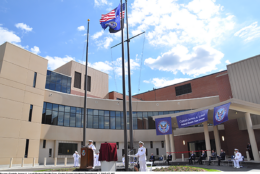IT Modernization
-
The Department of Veterans Affairs will deploy its electronic health record to a second site in March, with another 10 go-lives tentatively planned for later in 2022, after it spent more than a year grappling with usability, productivity and other challenges from the initial launch.
December 01, 2021 -
The Labor Department is leaning on experts in technology, process flow, equity, fraud and unemployment insurance to develop new capabilities that every state can use to modernize and better secure their unemployment insurance systems.
November 29, 2021 -
Mark Johnson, vice president of Federal Cloud at Oracle, joined host John Gilroy on this week's Federal Tech Talk to discuss the challenges federal information technology folks have in transitioning to the cloud.
November 29, 2021 -
30 years ago the Army recognized the importance of digitized information in making military operations more effective, and the value of full system integration, writes ARRAY's Michael Acton.
November 25, 2021 -
Defense Medical Logistics Standard Support failed to meet more than 40% of the needs staff at the Department of Veterans Affairs' first implementation site had identified, the VA inspector general told Congress last week.
November 23, 2021 -
Dan Graves, chief technology officer at Delphix, joined host John Gilroy on this week's Federal Tech Talk to discuss the challenges federal IT officials face when managing diverse data sets.
November 23, 2021 -
The former White House staffer plans to continue ADI's advocacy for the Technology Modernization Fund, as well as "smart" cybersecurity policies.
November 17, 2021 -
The DoD Data Strategy emphasizes the need for security to be a primary consideration in any data modernization project. It also stresses that access should be strictly controlled to only those users who need it, and that users should have access to only the data they need to complete their tasks.
November 17, 2021 -
idRamp President Mike Vesey joins host John Gilroy on this week's Federal Tech Talk to discuss how Identity Credential Access Management can help federal IT officials protect their agency's data.
November 15, 2021 -
Pat Flanders, the chief information officer at DHA, said the military services and defense agencies will see a more consistent and more secure set of technology tools.
November 12, 2021 -
Imagine Nation, the annual leadership conference put on by the American Council for Technology Industry Advisory Council, returned to in-person earlier this week.
November 10, 2021 -
The bureau spent years on several blockchain pilots, but is now partnering with the National Science Foundation to help reduce the reporting burden for grant recipients, while improving transparency around federal spending.
November 09, 2021 -
Maria Roat, the deputy federal chief information officer, said four agencies proved chat and calendar sharing capabilities was possible.
November 09, 2021 -
Janek Claus, director of Application Development at Sev1Tech, offered some remedies for this significant issue to host John Gilroy on this week's Federal Tech Talk.
November 08, 2021 -
Federal Drive with Tom Temin spoke to Allie Swanson from the Bureau of International Environmental and Scientific Affairs, and to Zoohackathon Program Manager Tory Peabody.
November 05, 2021
















